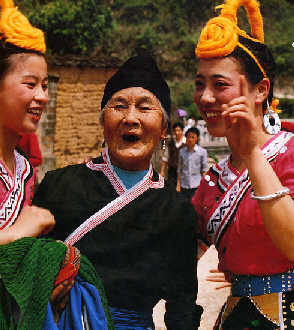Narrative Songs
Chinese minorities like to sing heroic epics, folklores, and folktales in the form of folk songs, this kind of song is usually in strophic form generally sung by a professional singer or semi-professional artisan with accompaniment or instrument, for example, songs about legendary love stories such as "Brother Mawu and Sister Gadou" ofHui ethnic group, "Erip and Senam" of Uygur ethnic group, "Saliha and Saman" ofKazak ethnic group; long heroic epics such as "Gesar" of Tibetan ethnic group, "Manas" ofKirgiz ethnic group; songs about the history and origin of a minority such as "the marriage between Fuxi and his sister" of Yao ethnic group in Guangxi; "gu'ge" (ancient song) ofMiao ethnic group, Bouyei ethnic group, and Shut ethnic group in Guizhou; "gao huang (ancient kings) song", "panhu (winding calabash gourd) song", "Genesis song", and "Pan Gu (creator of the universe in Chinese mythology) Genesis" of She ethnic group in Fujian and Zhejiang. In addition to the above, there are other forms with national characters such as passion and vigorous "rewap tanchang" (dance and instruments) of Uygur ethnic group, excited "dombira tangchang" ofKazak ethnic group, witty and humorous "kumuzi tanchang" of Kirgiz ethnic group, lyrical "kayago tanchang" of Korean ethnic group, melodious "niutui qin'ge" of Dong ethnic group, and "zhamunie tanchang" of Tibetan ethnic group.

Religious Songs
Religious beliefs are of importance in some minorities of China. Some minorities have the tradition of primordial worships, which is used in the time when people feel helpless before the nature, they pray with songs for gods to bless them, such as "shamanic tune" of Man ethnic group, "zhaodao (praying) tune" ofHui ethnic group of Islam, "sacrificial song", and "Buddha song" of minorities in southwest China.
